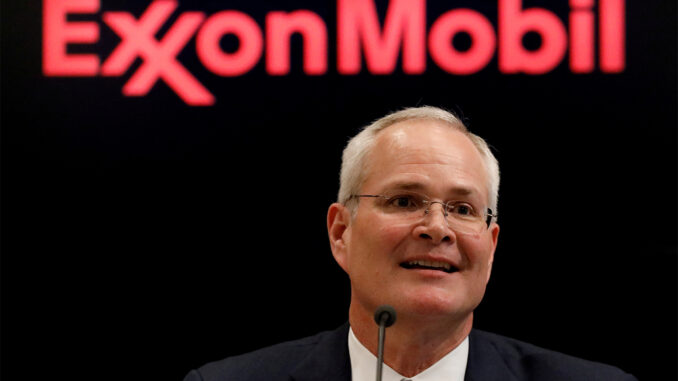
As it stands, we’re not on the path to net-zero emissions by 2050, Exxon Mobil CEO Darren Woods said. And maybe that’s not Big Oil’s fault.
“The dirty secret nobody talks about is how much all this is going to cost and who’s willing to pay for it,” Woods, who replaced Rex Tillerson at the helm of Exxon Mobil in January 2017, said. “If you look at the policies [governments] are putting out, the cost is very implicit. It’s not an explicit cost.”
As it stands, we’re not on the path to net-zero emissions by 2050, Exxon Mobil CEO Darren Woods said. And maybe that’s not Big Oil’s fault.
“The dirty secret nobody talks about is how much all this is going to cost and who’s willing to pay for it,” Woods, who replaced Rex Tillerson at the helm of Exxon Mobil in January 2017, said. “If you look at the policies [governments] are putting out, the cost is very implicit. It’s not an explicit cost.”
To have any chance of achieving carbon neutrality within the next 25 years, civilians must “be willing to pay for carbon reduction, because today we have opportunities to make fuels with lower carbon, but people aren’t willing to spend the money to do that,” he said. Businesses aren’t keen on shelling out, either. “We could, today, make sustainable aviation fuel for the airline business, but the airline companies can’t afford to pay.”
The onus is both political and the personal
The challenge, in Woods’ mind, is reframing the cost as necessary on both a corporate and personal level, rather than a nice-to-have. It’s anyone’s guess how long that would take. “I can’t predict if we’ll be successful in that space or not.” A popular suggestion for passing the cost off to consumers is carbon taxes or a built-in charge on purchased goods, though many experts nonetheless encourage the most offending firms to shoulder the cost burden, not individuals.
It’s larger society, in Woods’ mind, that has fallen short of its own expectations. “Frankly, society, and the activist—the dominant voice in this discussion—has tried to exclude the industry that has the most capacity and the highest potential for helping with some of the technologies,” he said. “How quickly will innovation come? How quickly can we scale [it]? How low can we get the cost? I, frankly, can’t answer that.”
Much work is left to be done—obviously. Woods points to one particular example: direct air capture, an advancement in which Exxon Mobil has invested heavily. “We just built a pilot plant prototype that we’re working on to try and cut the cost in half—which by the way, will still be too expensive,” he said. “But we want to get down on that curve. And there are a lot of companies out there trying to advance the technology in this space. How quickly will they succeed? I don’t know the answer to that.”
Murray pointed out the subsidies Exxon Mobil has received through the 2022 Inflation Reduction Act that are geared at encouraging low-carbon energy solutions. But Woods said that too is a Band-Aid solution. “The way that the government is incentivized and trying to catalyze investments in this space is through subsidies,” he said. “Driving significant investments at a scale that even gets close to moving the needle is going to cost a lot of money.”
The U.S. government is trying to “get things moving” through those subsidies, he added. “But I would tell you building a business on government subsidy is not a long-term sustainable strategy—we don’t support that.” Exxon Mobil has committed to using its IRA subsidies to advance its low-carbon energy solutions, “but at the same time, we’re advocating to move to market forces, either through regulation and prices on carbon.”
The challenge with all those solutions, he said, “is the cost ultimately, explicitly bears itself in the price of products out there.” And nobody wants to pay up.
This story was originally featured on Fortune.com



